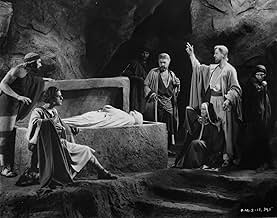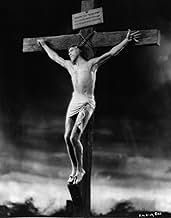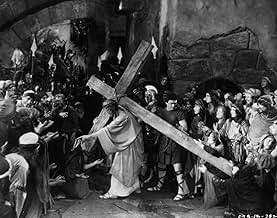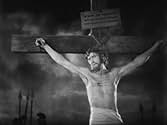VALUTAZIONE IMDb
7,3/10
2580
LA TUA VALUTAZIONE
Aggiungi una trama nella tua linguaJesus Christ faces religious and political oppression during his ministry and in the days before his death and resurrection.Jesus Christ faces religious and political oppression during his ministry and in the days before his death and resurrection.Jesus Christ faces religious and political oppression during his ministry and in the days before his death and resurrection.
- Premi
- 5 vittorie totali
- Director
- Sceneggiatura
- Tutti gli interpreti e le troupe
- Produzione, botteghino e altro su IMDbPro
Recensioni in evidenza
I'm not a religious man. Nevertheless, I found this to be a very moving picture.
Or series of pictures. So many of the shots are very clearly carefully set up, often to evoke famous paintings.
The use of light, though simple given the techniques of the day, is often very effective.
The story is told to include all the well-known episodes in the story of Christ. The pace is leisurely, but never too slow. Each scene is developed to its fullest.
And the acting - which is to say the faces - are sometimes remarkable.
If you're used to action movies, you'll never get through this. But if you can adopt yourself to its pace, you'll be amazed how effective this movie is.
Or series of pictures. So many of the shots are very clearly carefully set up, often to evoke famous paintings.
The use of light, though simple given the techniques of the day, is often very effective.
The story is told to include all the well-known episodes in the story of Christ. The pace is leisurely, but never too slow. Each scene is developed to its fullest.
And the acting - which is to say the faces - are sometimes remarkable.
If you're used to action movies, you'll never get through this. But if you can adopt yourself to its pace, you'll be amazed how effective this movie is.
Cecil B. DeMille produced this masterpiece over 90 years ago and it still retains its great power and reverence. Everyone associated with the production put their heart and soul into this work and it certainly shows on screen. The photography and background music score are to be particularly commended. By the way, any on-screen violence during the scourging and crucifixion sequences were kept to a minimum. Parents can view this film with their children and have no concerns. For some reason, this has very limited play on television in the United States. TCM plays the film on occasion. That cable channel seems to be the only place to watch this wonderful film. The Kino video tape and Criterion DVD release remain available for purchase. The DVD offers the original premiere cut and the shorter sound reissue. Some important sequences are shown in the uncut 155 minute version ( such as Peter's denial of Jesus). The sound reissue version is missing slightly less than 30 minutes and this is the one most people have seen throughout the years. Both versions are superb in their own way. This film will truly touch your heart. By all means, seek it out. A true silent classic.
10blue-7
I first experienced Cecil B. DeMille's beautiful telling of the Life of Christ, his 1927 THE KING OF KINGS, in a local theatre in the late 1950s. It impressed me then as a teenager and it impresses me even more now, having just experienced a special viewing of the double disc DVD that is being released on December 7, 2004 under The Criterion Collection label.
I purchased a 16mm print of this film many years ago as well as buying the Criterion Laser Dics release a few years back, so I am well versed in this classic. Until now, everything shown theatrically, on 16mm, VHS tape and Laser Discs has been of the re-edited version that DeMille prepared in 1928, a year after the film played its roadshow engagements. Millions of people the world over have seen the shorter 112 minute cut, which is included on the Criterion disc with both the original Hugo Riesenfeld score (and sound effects) as issued in 1928, and an outstanding newly recorded pipe organ score by Timothy J. Tikker, done especially for this release.
For years I have been aware that the roadshow version as shown at the Grauman's Chinese Theatre in LA and at the Gaiety in NY, ran 155 minutes, some 37 minutes longer then I had ever seen it. From James D'Arc at the Brigham Young University Archives (which houses the DeMille collection) I learned that the full length version still existed and was in the possession of the DeMille family. That complete version is now the highlight of the Criterion DVD release and it is MARVELOUS!
I've always thought highly of DeMille's THE KING OF KINGS -- but now seeing it in this wonderfully preserved full-length print, complete with an outstanding original orchestra score by Donald Sosin, I can say without hesitation that it is a more spiritually uplifting experience in this version then it ever was in the fine shorter cut. This is a MASTERPIECE, not only of the silent cinema, but of all-time!
And that's not all -- the EXTRA's included on the two DVD's are also a marvel. There is almost 15 minutes of priceless behind-the-scenes footage on the set of the film. You'll see DeMille directing a huge cast and at times view three cameras being hand-cranked. There are shots of D.W. Griffith and Douglas Fairbanks visiting with DeMille on set. There are production and costume sketches by renowned artist Dan Sayre Groesbeck as well as a stills gallery of rare production and publicity photos. The original illustrated theatre program and press book are pictured also -- and there's more. In short this is the finest DVD ever released on a film from the silent era, even surpassing Fox's marvelous job on F.W. Murnau's SUNRISE (also a 1927 release).
In my opinion, DeMille's THE KING OF KINGS in this full version is the finest rendering of the Life of Christ ever put on film! Criterion, known as the leader of fine DVD's, has done it again. Don't hesitate on picking up a copy of this if you love great movies and want a spiritual experience!
I purchased a 16mm print of this film many years ago as well as buying the Criterion Laser Dics release a few years back, so I am well versed in this classic. Until now, everything shown theatrically, on 16mm, VHS tape and Laser Discs has been of the re-edited version that DeMille prepared in 1928, a year after the film played its roadshow engagements. Millions of people the world over have seen the shorter 112 minute cut, which is included on the Criterion disc with both the original Hugo Riesenfeld score (and sound effects) as issued in 1928, and an outstanding newly recorded pipe organ score by Timothy J. Tikker, done especially for this release.
For years I have been aware that the roadshow version as shown at the Grauman's Chinese Theatre in LA and at the Gaiety in NY, ran 155 minutes, some 37 minutes longer then I had ever seen it. From James D'Arc at the Brigham Young University Archives (which houses the DeMille collection) I learned that the full length version still existed and was in the possession of the DeMille family. That complete version is now the highlight of the Criterion DVD release and it is MARVELOUS!
I've always thought highly of DeMille's THE KING OF KINGS -- but now seeing it in this wonderfully preserved full-length print, complete with an outstanding original orchestra score by Donald Sosin, I can say without hesitation that it is a more spiritually uplifting experience in this version then it ever was in the fine shorter cut. This is a MASTERPIECE, not only of the silent cinema, but of all-time!
And that's not all -- the EXTRA's included on the two DVD's are also a marvel. There is almost 15 minutes of priceless behind-the-scenes footage on the set of the film. You'll see DeMille directing a huge cast and at times view three cameras being hand-cranked. There are shots of D.W. Griffith and Douglas Fairbanks visiting with DeMille on set. There are production and costume sketches by renowned artist Dan Sayre Groesbeck as well as a stills gallery of rare production and publicity photos. The original illustrated theatre program and press book are pictured also -- and there's more. In short this is the finest DVD ever released on a film from the silent era, even surpassing Fox's marvelous job on F.W. Murnau's SUNRISE (also a 1927 release).
In my opinion, DeMille's THE KING OF KINGS in this full version is the finest rendering of the Life of Christ ever put on film! Criterion, known as the leader of fine DVD's, has done it again. Don't hesitate on picking up a copy of this if you love great movies and want a spiritual experience!
This Cecil B. DeMille silent classic is still well worth seeing. It is creative and interesting, while remaining respectful to its subject, and thus it is among the best of the many movies made about Jesus. Unlike most directors (especially today), DeMille did not think that he was bigger than his subject, and thus he uses his skills to illustrate the well-known story and to make it memorable, rather than expending time and energy in trying to push some trivial perspective of his own. He makes it lavish when it should be lavish, and keeps it simple when it should be simple.
The opening scene, with Mary Magdalene and her admirers hearing bits of news regarding Jesus and Judas Iscariot, is a good introduction to the rest of the story, and also sets the tone for what follows. While it is a fictionalized scene not found in the Bible, it seems natural and works well. The rest of the movie likewise does not always follow the biblical narratives exactly, but the added material is always in keeping with the main themes. The cast is pretty good, although given the nature of the story, most of them have limited screen time. H.B. Warner looks just a little too old to be fully convincing as Jesus, but otherwise he is good enough in a difficult role. Probably the best performance is given by Joseph Schildkraut as Judas. He is quite believable, and is especially good in the Last Supper scene. His father Rudolph is also good in a smaller role as the high priest Caiaphas.
With the vast number of movies that are always being made about religious subjects, no doubt it will only be silent movie fans who will seek out this version of "The King of Kings", but that's unfortunate because it is nicely made and has many positives that make it worth seeing.
The opening scene, with Mary Magdalene and her admirers hearing bits of news regarding Jesus and Judas Iscariot, is a good introduction to the rest of the story, and also sets the tone for what follows. While it is a fictionalized scene not found in the Bible, it seems natural and works well. The rest of the movie likewise does not always follow the biblical narratives exactly, but the added material is always in keeping with the main themes. The cast is pretty good, although given the nature of the story, most of them have limited screen time. H.B. Warner looks just a little too old to be fully convincing as Jesus, but otherwise he is good enough in a difficult role. Probably the best performance is given by Joseph Schildkraut as Judas. He is quite believable, and is especially good in the Last Supper scene. His father Rudolph is also good in a smaller role as the high priest Caiaphas.
With the vast number of movies that are always being made about religious subjects, no doubt it will only be silent movie fans who will seek out this version of "The King of Kings", but that's unfortunate because it is nicely made and has many positives that make it worth seeing.
Cecil B. DeMille's film about Jesus was made during a period in his career when he left Paramount and organized his own studio. Unfortunately for DeMille his studio went belly up after the stock market crash of 1929. The King of Kings is unquestionably the greatest film he made during that period.
But in DeMille's cinema gospel he eschewed the traditional Christmas story to be found in those four other gospels. DeMille begins his movie with a real lavish party at the home of a noted women of the town Mary Magdalene played by Jacqueline Logan. It's DeMille showing revelry at its best and most alluring.
Logan asks why one of her favorites, Judas Iscariot hasn't been attending her clambakes recently. She hears he's been hanging around with this carpenter from Nazareth reputed to have performed some miracles and who doesn't approve of her lifestyle.
That's it for Ms. Magadalene; she's not about to let this hick take one of her favorites away. Off in a chariot pulled by Zebras she goes after this carpenter. She finds H.B. Warner as Jesus doing one of the miracles and becomes a follower herself.
After this the film becomes a reverential straightforward account as you would find in the Bible.
Reverence and revelry, the hallmark of a DeMille film is found in equal measure in The King of Kings. H.B. Warner does a fine job in the lead role, he makes a saintly Jesus. I do wonder what led DeMille to cast Warner, to think of him in the first place. Warner was 52 at the time playing a 30 something Jesus.
The King of Kings offers the movie fan to see father and son Rudolph and Joseph Schildkraut who play Caiaphas and Judas. Both contribute fine performances to the endeavor. Unlike later gospel based films, this one clearly has Caiaphas as the villain of the piece. He's described in the subtitles as a man concerned more with 'revenue than religion' which doesn't make him all that different from some folks I could mention today. The Schildkrauts however were Jewish and stars in the Yiddish Theater in Europe and America. They got good and slammed for their participation in The King of Kings by more than a few of their co-religionists.
Sharp eyed viewers will also note that the guy playing Simon of Cyrene who helps Jesus with his cross is none other than Hopalong Cassidy, William Boyd. Boyd was a DeMille discovery and had previously starred in another DeMille production, The Volga Boatman. This of course was years before he became the idol of the nation's children.
In his autobiography DeMille goes into some detail about how Jeremiah Milbank helped him with the financing of the DeMille Studio from which The King of Kings was produced. After the initial run, Milbank set up a foundation in which prints of The King of Kings were copied and made available to various Christian mission groups free for their work. It's one reason why this particular film is never in any danger of being lost.
DeMille was told on at least one occasion that this was his greatest picture because there is no greater subject. It's arguably one of his best from a technical standpoint. Still for the hundreds of millions of affiliated Christians on the planet, The King of Kings certainly occupies a special place.
But in DeMille's cinema gospel he eschewed the traditional Christmas story to be found in those four other gospels. DeMille begins his movie with a real lavish party at the home of a noted women of the town Mary Magdalene played by Jacqueline Logan. It's DeMille showing revelry at its best and most alluring.
Logan asks why one of her favorites, Judas Iscariot hasn't been attending her clambakes recently. She hears he's been hanging around with this carpenter from Nazareth reputed to have performed some miracles and who doesn't approve of her lifestyle.
That's it for Ms. Magadalene; she's not about to let this hick take one of her favorites away. Off in a chariot pulled by Zebras she goes after this carpenter. She finds H.B. Warner as Jesus doing one of the miracles and becomes a follower herself.
After this the film becomes a reverential straightforward account as you would find in the Bible.
Reverence and revelry, the hallmark of a DeMille film is found in equal measure in The King of Kings. H.B. Warner does a fine job in the lead role, he makes a saintly Jesus. I do wonder what led DeMille to cast Warner, to think of him in the first place. Warner was 52 at the time playing a 30 something Jesus.
The King of Kings offers the movie fan to see father and son Rudolph and Joseph Schildkraut who play Caiaphas and Judas. Both contribute fine performances to the endeavor. Unlike later gospel based films, this one clearly has Caiaphas as the villain of the piece. He's described in the subtitles as a man concerned more with 'revenue than religion' which doesn't make him all that different from some folks I could mention today. The Schildkrauts however were Jewish and stars in the Yiddish Theater in Europe and America. They got good and slammed for their participation in The King of Kings by more than a few of their co-religionists.
Sharp eyed viewers will also note that the guy playing Simon of Cyrene who helps Jesus with his cross is none other than Hopalong Cassidy, William Boyd. Boyd was a DeMille discovery and had previously starred in another DeMille production, The Volga Boatman. This of course was years before he became the idol of the nation's children.
In his autobiography DeMille goes into some detail about how Jeremiah Milbank helped him with the financing of the DeMille Studio from which The King of Kings was produced. After the initial run, Milbank set up a foundation in which prints of The King of Kings were copied and made available to various Christian mission groups free for their work. It's one reason why this particular film is never in any danger of being lost.
DeMille was told on at least one occasion that this was his greatest picture because there is no greater subject. It's arguably one of his best from a technical standpoint. Still for the hundreds of millions of affiliated Christians on the planet, The King of Kings certainly occupies a special place.
Lo sapevi?
- QuizCecil B. DeMille did not want to take any chances with the film. His two stars, H.B. Warner and Dorothy Cumming, were required to sign agreements which prohibited them from appearing in film roles that might compromise their "holy" screen images for a five-year period. DeMille also ordered them not to be seen doing any "un-Biblical" activities during the film's shooting. These activities included attending ball games, playing cards, frequenting night clubs, swimming, and riding in convertibles.
- BlooperIn the first scene in Mary Magdalene's house, studio lights are reflected in a large hand-held mirror.
- Citazioni
Mary Magdalene: Harness my zebras--gift of the Nubian King! This Carpenter shall learn that he cannot hold a man from Mary Magdalene!
- Curiosità sui creditiIn the original premiere version, there is no 'THE END' title. The film fades to black after the final scene of Jesus looming over a modern city with the title 'LO, I AM WITH YOU ALWAYS' superimposed.
- Versioni alternativeThe 1927 premiere, the first film shown at Grauman's Chinese Theatre, ran 155 minutes. The film later was cut to 112 minutes for general release.
- ConnessioniEdited into Tingen, Edderkoppen 2: Bivirkninger (2013)
I più visti
Accedi per valutare e creare un elenco di titoli salvati per ottenere consigli personalizzati
- How long is The King of Kings?Powered by Alexa
Dettagli
- Data di uscita
- Paese di origine
- Lingua
- Celebre anche come
- The King of Kings
- Luoghi delle riprese
- Santa Catalina Island, Channel Islands, California, Stati Uniti(Sea of Galilee scene)
- Azienda produttrice
- Vedi altri crediti dell’azienda su IMDbPro
Botteghino
- Budget
- 2.500.000 USD (previsto)
- Tempo di esecuzione2 ore 40 minuti
- Colore
- Mix di suoni
- Proporzioni
- 1.33 : 1
Contribuisci a questa pagina
Suggerisci una modifica o aggiungi i contenuti mancanti

Divario superiore
By what name was Il re dei re (1927) officially released in India in English?
Rispondi



































